浅析法语借词对英语词汇的影响
- 格式:pdf
- 大小:349.86 KB
- 文档页数:5

浅谈法语对英语词汇与语法的影响-法语论文-语言学论文——文章均为WORD文档,下载后可直接编辑使用亦可打印——摘要:英语在其发展历史中经历了许多变化, 而法语对英语的发展, 尤其是英语词汇的发展, 有着不可忽视的影响。
本文对英语发生变化的社会历史背景进行了阐述, 并且对英语词汇受法语影响的四个方面进行了具体分析。
关键词:英语词汇; 法语影响; 语言变化;1 引言像世界上的其它语言一样, 英语在其发展历史中经历了许多变化, 有些是因为语言本身的发展需要, 有些则是与其他语言接触的结果。
对英语发展影响最大的一门语言当属法语了, 它使得英语从一门几乎纯粹的语言发展成为一门相当复杂的语言。
诺曼征服之后, 英国被诺曼法国人统治了将近两个世纪, 数以千计的法语单词涌入英语词汇, 使得英语这门语言更加多样化和复杂化。
Baugh (1963) 表示:在中世纪英语时期, 英语中的法语单词几乎达到了10, 000词左右, 而其中75%的单词仍然在频繁被使用。
2 社会历史背景2.1 英语法语的早期接触法语对英语的影响并非是从诺曼征服才开始的, 早在盎格鲁-撒克逊时代后期, 英国就同法国有着密切的联系。
1042年, 爱德华继承了英国王位, 由于其母亲是一位法国公主, 他的统治使得英语和法语的有了最早的接触。
在他统治期间, 他的诺曼底朋友在各个重要政府和教堂机关都占据了重要的职位, 法语单词开始进入英语词汇。
爱德华死后, 哈罗德继承王位, 但很快诺曼底公爵威廉在1066年入侵了英国, 打败了哈罗德, 成为了新的统治者, 这就是着名的诺曼征服。
1066年的诺曼征服不仅使盎格鲁诺曼人成为英国的统治阶级, 而且他们使用的语言也开始渗透到英国的各个领域, 盎格鲁法语也成为了除传统的拉丁语以外国家法庭和商业事务使用的官方语言(Singh, 2005, p.107) 。
诺曼征服以后, 上至统治阶级, 下到他们的仆人都是诺曼法国人, 与此同时, 大批的下层诺曼法国人也来到英国定居, 并使用他们自己的语言, 即诺曼法语, 这持续了将近200年。
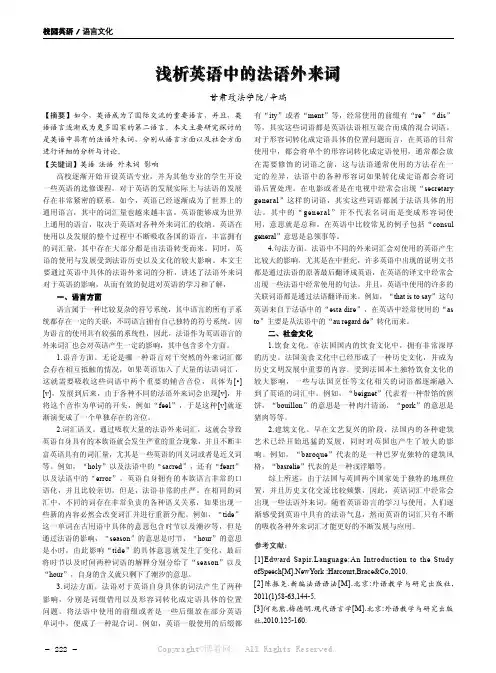
- 222 -校园英语 /语言文化浅析英语中的法语外来词甘肃政法学院/辛瑞【摘要】如今,英语成为了国际交流的重要语言,并且,英语语言逐渐成为更多国家的第二语言。
本文主要研究探讨的是英语中具有的法语外来词,分别从语言方面以及社会方面进行详细的分析与讨论。
【关键词】英语 法语 外来词 影响高校逐渐开始开设英语专业,并为其他专业的学生开设一些英语的选修课程。
对于英语的发展实际上与法语的发展存在非常紧密的联系。
如今,英语已经逐渐成为了世界上的通用语言,其中的词汇量也越来越丰富。
英语能够成为世界上通用的语言,取决于英语对各种外来词汇的收纳。
英语在使用以及发展的整个过程中不断吸收各国的语言,丰富拥有的词汇量,其中存在大部分都是由法语转变而来。
同时,英语的使用与发展受到法语历史以及文化的较大影响。
本文主要通过英语中具体的法语外来词的分析,讲述了法语外来词对于英语的影响,从而有效的促进对英语的学习和了解,一、语言方面语言属于一种比较复杂的符号系统,其中语言的所有子系统都存在一定的关联,不同语言拥有自己独特的符号系统。
因为语言的使用具有较强的系统性,因此,法语作为英语语言的外来词汇也会对英语产生一定的影响,其中包含多个方面。
1.语音方面。
无论是哪一种语言对于突然的外来词汇都会存在相互抵触的情况,如果英语加入了大量的法语词汇,这就需要吸收这些词语中两个重要的辅音音位,具体为[•][v],发展到后来,由于各种不同的法语外来词会出现[v],并将这个音作为单词的开头,例如“feel ”,于是这种[v]就逐渐演变成了一个单独存在的音位。
2.词汇语义。
通过吸收大量的法语外来词汇,这就会导致英语自身具有的本族语就会发生严重的重合现象,并且不断丰富英语具有的词汇量,尤其是一些英语的同义词或者是近义词等。
例如,“holy ”以及法语中的“sacred ”,还有“feart ”以及法语中的“error ”。
英语自身拥有的本族语言非常的口语化,并且比较亲切,但是,法语非常的庄严。
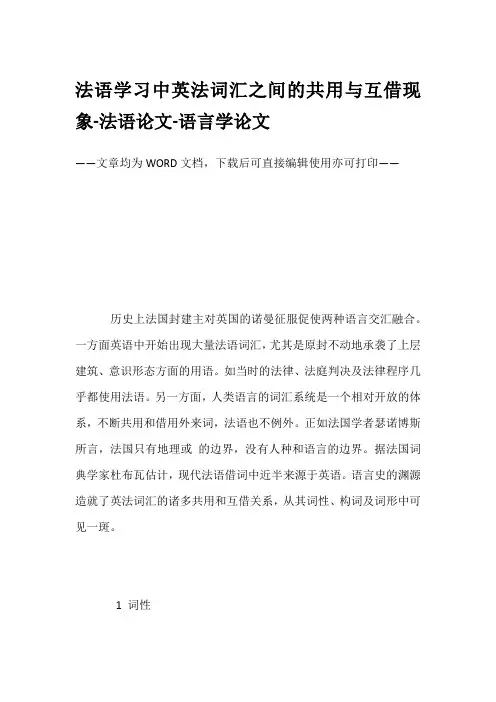
法语学习中英法词汇之间的共用与互借现象-法语论文-语言学论文——文章均为WORD文档,下载后可直接编辑使用亦可打印——历史上法国封建主对英国的诺曼征服促使两种语言交汇融合。
一方面英语中开始出现大量法语词汇,尤其是原封不动地承袭了上层建筑、意识形态方面的用语。
如当时的法律、法庭判决及法律程序几乎都使用法语。
另一方面,人类语言的词汇系统是一个相对开放的体系,不断共用和借用外来词,法语也不例外。
正如法国学者瑟诺博斯所言,法国只有地理或的边界,没有人种和语言的边界。
据法国词典学家杜布瓦估计,现代法语借词中近半来源于英语。
语言史的渊源造就了英法词汇的诸多共用和互借关系,从其词性、构词及词形中可见一斑。
1 词性法语和英语的每种词性中都存在共用和互借现象,既有完全共用的词汇,也有部分词汇因二者不同的语音规则体系而导致拼写有轻微的变化。
但这种变化是有规律可循的,以下仅以名词、动词、形容词和副词四种词性为例进行探究。
1.1 名词完全共用的如:chef、souvenir、job、week-end、force、chan-ce、situation 等;另有部分词汇在两种语言中词尾有所演变,如下表;1.2 动词英语动词无特殊词尾,而法语动词的词尾则大部分为-er、-ir,因此很多法语动词相比英语动词多了字母r 或er,主要义素仍相同。
如arrive(英)、arriver(法);oblige(英)、oblige(r法);accep(t 英)、accepte(r法)等。
1.3 形容词英语与法语的形容词词尾不尽相同。
英语形容词的词尾-al 对应法语中的-el,如forma(l英)、forme(l法);cultural(英)、culture (l法);英语中的-cal 或-c 对应法语的-que,如physica(l英)、physique(法);fantastic(英)、fantastique(法)等。
1.4 副词英语中的副词多以-ly 结尾,而法语中对应的副词词尾则为-ment,如essentially(英)、essentiellemen(t法);certainly(英)、certainemen(t法)等。
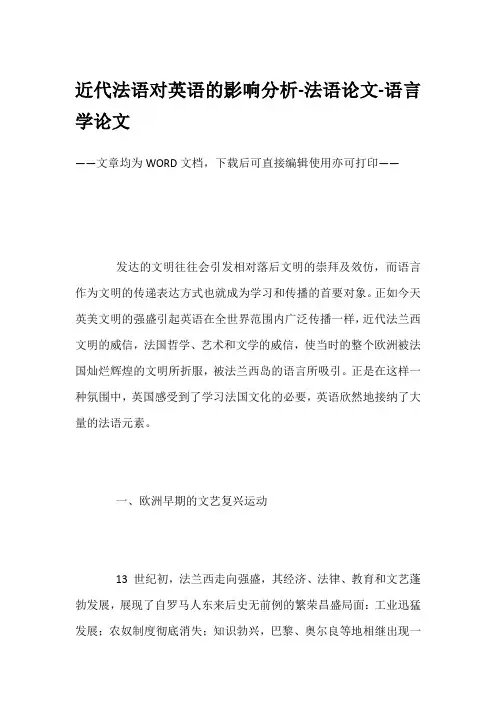
近代法语对英语的影响分析-法语论文-语言学论文——文章均为WORD文档,下载后可直接编辑使用亦可打印——发达的文明往往会引发相对落后文明的崇拜及效仿,而语言作为文明的传递表达方式也就成为学习和传播的首要对象。
正如今天英美文明的强盛引起英语在全世界范围内广泛传播一样,近代法兰西文明的威信,法国哲学、艺术和文学的威信,使当时的整个欧洲被法国灿烂辉煌的文明所折服,被法兰西岛的语言所吸引。
正是在这样一种氛围中,英国感受到了学习法国文化的必要,英语欣然地接纳了大量的法语元素。
一、欧洲早期的文艺复兴运动13 世纪初,法兰西走向强盛,其经济、法律、教育和文艺蓬勃发展,展现了自罗马人东来后史无前例的繁荣昌盛局面:工业迅猛发展;农奴制度彻底消失;知识勃兴,巴黎、奥尔良等地相继出现一批着名大学;文学成就也层出不穷;经院哲学兴起;哥特式建筑与雕刻日臻完美。
法兰西达到了基督教文明的巅峰。
法国历史上第一所大学-索邦大学(la Sorbonne)成为中世纪欧洲大学的典范,英国的牛津大学和剑桥大学都是按照它的模式创办的。
巴黎大学的学生不仅来自法国各地,还有许多来自其他欧洲国家,是13 世纪欧洲学生人数最多和最着名的学术研究中心,西欧各地的着名学者都云集到巴黎大学执教。
以英雄史诗为代表的中世纪法国文学则对后世法国及欧洲文学产生了不可小觑的影响,并赋予了法语无穷的魅力,这些都推动了法语的传播。
从11 世纪末起,法语作为一种已经发展成熟的文学语言享誉欧洲。
虽然这一时期法语在英国广泛使用得益于上的便利(1066 年法国诺曼底公爵入侵英国开始了在英国的诺曼王朝统治),但是如果没有文化上的优越和吸引,英国人对法语的使用不可能长达三个世纪,也不会在英语中使用如此多的法语借词并把它们当中的70% 都保留了下来。
以饮食为例,诺曼人到来之前,英国菜式相当粗糙,只有炖肉和简单的肉汤,但伴随法国文化的传入,中世纪的英国菜变得精致多了。
英语中的烹饪词汇几乎都源于法语(以下为现代法语拼写),例如:cuisine(烹调)cuisine;biol(煮)bouillir;fry(炸)frire;roast(烤)r?tir;griller(灸烧)griller;mince(剁肉)mincer;braise(焖)braiser;sauce (加调料)saucer;broach(用铁叉串肉)brocheter;toast(烘烤)toster 等。
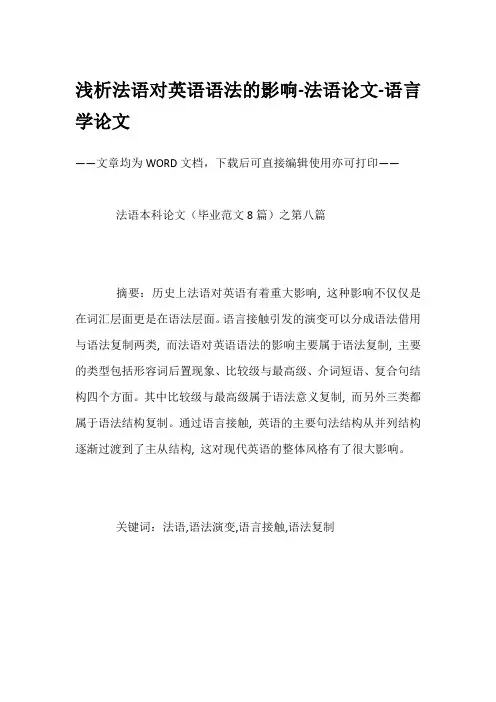
浅析法语对英语语法的影响-法语论文-语言学论文——文章均为WORD文档,下载后可直接编辑使用亦可打印——法语本科论文(毕业范文8篇)之第八篇摘要:历史上法语对英语有着重大影响, 这种影响不仅仅是在词汇层面更是在语法层面。
语言接触引发的演变可以分成语法借用与语法复制两类, 而法语对英语语法的影响主要属于语法复制, 主要的类型包括形容词后置现象、比较级与最高级、介词短语、复合句结构四个方面。
其中比较级与最高级属于语法意义复制, 而另外三类都属于语法结构复制。
通过语言接触, 英语的主要句法结构从并列结构逐渐过渡到了主从结构, 这对现代英语的整体风格有了很大影响。
关键词:法语,语法演变,语言接触,语法复制一、引言英语在历史发展的过程中曾与很多语言发生过接触, 其中尤以法语为甚。
法语对英语的影响是全方面的, 其中主要是词汇的借用:英语中的法语借词占的比例大约有30%, 其中包括了很多现代英语的常用词, 尤其是在艺术、法律、学术、饮食等方面的词汇。
然而, 词汇借用并不仅仅是英法语言接触的唯一结果, 法语对英语的影响也体现在语法方面, 而相关的研究尚未得到足够的重视。
本文将从语言接触引起的语法演变的角度来对法语对英语语法的影响进行了一个初步的探究。
二、语言接触与语法演变语言接触(language contact) 是语言学中经常被研究的现象, 托马森(Thomason) [1]1对其的定义为在同一时间与同一地点超过一种语言同时使用的现象。
语言接触往往会带来语言的演变, 其主要形式是语言特征的迁移(transfer) , 即某种语言(即源语, source language) 的某个特征迁移到了另一种语言(即受语, recipientlanguage) 之中。
接触程度的不同, 语言演变的程度也会有所差异。
需要指出的是, 不同类型的语言特征, 其在语言接触中发生迁移的可能性及先后顺序也是有区别的。
一般而言, 对于偶然的接触, 语言迁移主要是实意词(尤其是名词) ;而对于强度不高的接触, 语言迁移在词汇上开始出现功能词, 而结构上, 一方面新词的借入会带来新的音位, 一方面在句法上旧有的结构会产生新的功能;当接触强度更高时, 更多的功能词会被借入, 甚至包括基本词汇也可能被借, 而在结构方面, 更多的音系特征会得到迁移, 句法上语序会发生改变, 形态上屈折词缀和范畴可能会被借入受语;当接触达到最高强度之时, 词汇会得到更大量的借入, 而结构也会有更多的成分被借入, 甚至对受语的语言形态产生根本性的变化[1]。
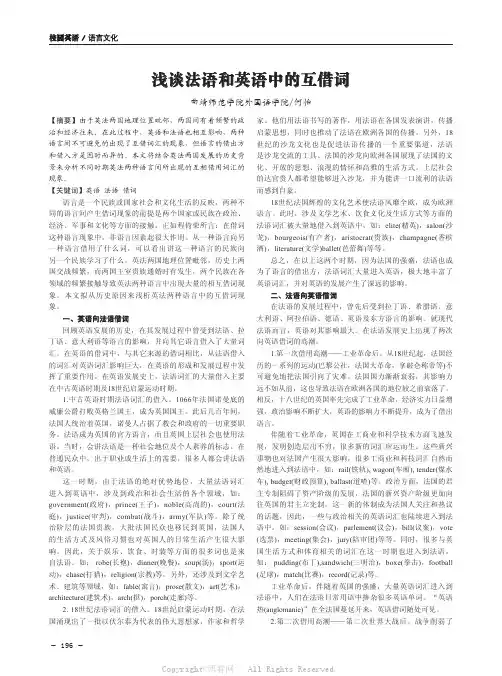
- 196-校园英语 / 语言文化浅谈法语和英语中的互借词曲靖师范学院外国语学院/何怡【摘要】由于英法两国地理位置毗邻,两国间有着频繁的政治和经济往来。
在此过程中,英语和法语也相互影响,两种语言间不可避免的出现了互借词汇的现象,但语言的借出方和借入方是因时而异的。
本文将结合英法两国发展的历史背景来分析不同时期英法两种语言间所出现的互相借用词汇的现象。
【关键词】英语 法语 借词语言是一个民族或国家社会和文化生活的反映,两种不同的语言间产生借词现象的前提是两个国家或民族在政治、经济、军事和文化等方面的接触。
正如程倚荣所言:在借词这种语言现象中,非语言因素起很大作用。
从一种语言向另一种语言借用了什么词,可以看出讲这一种语言的民族向另一个民族学习了什么。
英法两国地理位置毗邻,历史上两国交战频繁,而两国王室贵族通婚时有发生,两个民族在各领域的频繁接触导致英法两种语言中出现大量的相互借词现象。
本文拟从历史原因来浅析英法两种语言中的互借词现象。
一、英语向法语借词回顾英语发展的历史,在其发展过程中曾受到法语、拉丁语、意大利语等语言的影响,并向其它语言借入了大量词汇。
在英语的借词中,与其它来源的借词相比,从法语借入的词汇对英语词汇影响巨大,在英语的形成和发展过程中发挥了重要作用。
在英语发展史上,法语词汇的大量借入主要在中古英语时期及18世纪启蒙运动时期。
1.中古英语时期法语词汇的借入。
1066年法国诺曼底的威廉公爵打败英格兰国王,成为英国国王。
此后几百年间,法国人统治着英国,诺曼人占据了教会和政府的一切重要职务。
法语成为英国的官方语言,而且英国上层社会也使用法语。
当时,会讲法语是一种社会地位及个人素养的标志。
在普通民众中,出于职业或生活上的需要,很多人都会讲法语和英语。
这一时期,由于法语的绝对优势地位,大量法语词汇进入到英语中,涉及到政治和社会生活的各个领域,如:government(政府),prince(王子),noble(高尚的),court(法庭),justice(审判),combat(战斗),army(军队)等。
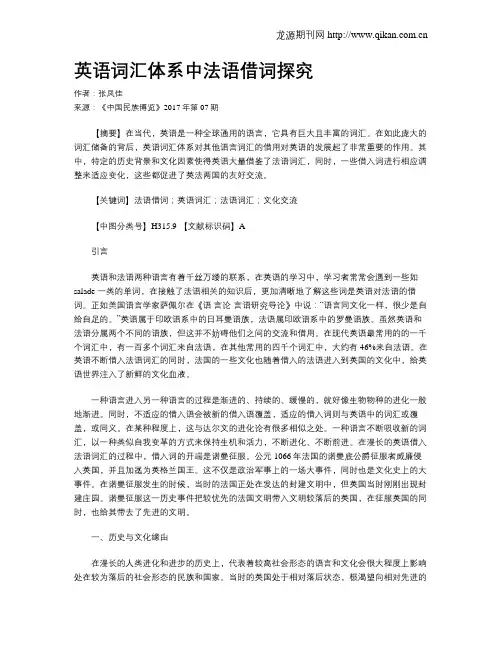
英语词汇体系中法语借词探究作者:张凤佳来源:《中国民族博览》2017年第07期【摘要】在当代,英语是一种全球通用的语言,它具有巨大且丰富的词汇。
在如此庞大的词汇储备的背后,英语词汇体系对其他语言词汇的借用对英语的发展起了非常重要的作用。
其中,特定的历史背景和文化因素使得英语大量借鉴了法语词汇,同时,一些借入词进行相应调整来适应变化,这些都促进了英法两国的友好交流。
【关键词】法语借词;英语词汇;法语词汇;文化交流【中图分类号】H315.9 【文献标识码】A引言英语和法语两种语言有着千丝万缕的联系,在英语的学习中,学习者常常会遇到一些如salade 一类的单词,在接触了法语相关的知识后,更加清晰地了解这些词是英语对法语的借词。
正如美国语言学家萨佩尔在《语言论-言语研究导论》中说:“语言同文化一样,很少是自给自足的。
”英语属于印欧语系中的日耳曼语族,法语属印欧语系中的罗曼语族。
虽然英语和法语分属两个不同的语族,但这并不妨碍他们之间的交流和借用。
在现代英语最常用的的一千个词汇中,有一百多个词汇来自法语,在其他常用的四千个词汇中,大约有46%来自法语。
在英语不断借入法语词汇的同时,法国的一些文化也随着借入的法语进入到英国的文化中,给英语世界注入了新鲜的文化血液。
一种语言进入另一种语言的过程是渐进的、持续的、缓慢的,就好像生物物种的进化一般地渐进。
同时,不适应的借入语会被新的借入语覆盖,适应的借入词则与英语中的词汇或覆盖,或同义。
在某种程度上,这与达尔文的进化论有很多相似之处。
一种语言不断吸收新的词汇,以一种类似自我变革的方式来保持生机和活力,不断进化、不断前进。
在漫长的英语借入法语词汇的过程中,借入词的开端是诺曼征服。
公元1066年法国的诺曼底公爵征服者威廉侵入英国,并且加冕为英格兰国王。
这不仅是政治军事上的一场大事件,同时也是文化史上的大事件。
在诺曼征服发生的时候,当时的法国正处在发达的封建文明中,但英国当时刚刚出现封建庄园。
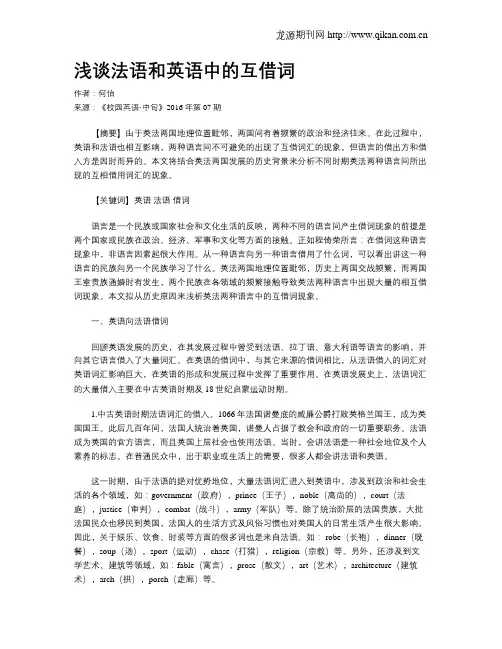
浅谈法语和英语中的互借词作者:何怡来源:《校园英语·中旬》2016年第07期【摘要】由于英法两国地理位置毗邻,两国间有着频繁的政治和经济往来。
在此过程中,英语和法语也相互影响,两种语言间不可避免的出现了互借词汇的现象,但语言的借出方和借入方是因时而异的。
本文将结合英法两国发展的历史背景来分析不同时期英法两种语言间所出现的互相借用词汇的现象。
【关键词】英语法语借词语言是一个民族或国家社会和文化生活的反映,两种不同的语言间产生借词现象的前提是两个国家或民族在政治、经济、军事和文化等方面的接触。
正如程倚荣所言:在借词这种语言现象中,非语言因素起很大作用。
从一种语言向另一种语言借用了什么词,可以看出讲这一种语言的民族向另一个民族学习了什么。
英法两国地理位置毗邻,历史上两国交战频繁,而两国王室贵族通婚时有发生,两个民族在各领域的频繁接触导致英法两种语言中出现大量的相互借词现象。
本文拟从历史原因来浅析英法两种语言中的互借词现象。
一、英语向法语借词回顾英语发展的历史,在其发展过程中曾受到法语、拉丁语、意大利语等语言的影响,并向其它语言借入了大量词汇。
在英语的借词中,与其它来源的借词相比,从法语借入的词汇对英语词汇影响巨大,在英语的形成和发展过程中发挥了重要作用。
在英语发展史上,法语词汇的大量借入主要在中古英语时期及18世纪启蒙运动时期。
1.中古英语时期法语词汇的借入。
1066年法国诺曼底的威廉公爵打败英格兰国王,成为英国国王。
此后几百年间,法国人统治着英国,诺曼人占据了教会和政府的一切重要职务。
法语成为英国的官方语言,而且英国上层社会也使用法语。
当时,会讲法语是一种社会地位及个人素养的标志。
在普通民众中,出于职业或生活上的需要,很多人都会讲法语和英语。
这一时期,由于法语的绝对优势地位,大量法语词汇进入到英语中,涉及到政治和社会生活的各个领域,如:government(政府),prince(王子),noble(高尚的),court(法庭),justice(审判),combat(战斗),army(军队)等。
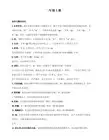
英语中的法语借词摘要:词汇学,作为语言学的一个分支,比过去起着更加重要的作用。
长期以来,英语和法语互相影响,不断从对方假借和吸收词汇,以丰富本语语言。
目前,随着英语在全球的广泛使用,它对法语的影响仍然在不断增强。
但是,有关法语词汇的英语著作很少,而有关法语中的英语外来词的著作更少。
本文主要研究英、法两种语言之间的借用的历史和所依附的社会背景以及一般借用方式和法语教学中的英语借词,帮助以法语为第二外语的英语学习者利用已有英语知识扩大法语词汇量和提高阅读速度。
这篇论文不仅有利于法语学习者和教学者,而且也为进一步研究法语中的英语借词开拓了新的领域。
关键词:英语;法语;借词;借用On English Loan Words in FrenchMAI HuameiAbstract: Lexicology,as a branch of linguistics, is becoming even more important than in the past. English and French have influenced each other in terms of their mutual word borrowing and enrichment over history. At present, as English is widely used all over the world, its influence on French is still on the rise. Nevertheless, there are few English works about French vocabulary, let alone those about English loan words in French. This paper focuses on the history, social background, general methods of word borrowing by French from English, and the learning and teaching of English loan words in French in an attempt to help English learners who take French as their second foreign language to make full use of English vocabulary to enlarge their French vocabulary and improve their reading skill. The research has opened a new area for the further study of English loan words in French and will be helpful to both the learners and the teachers.Key words: English; French; loan words; borrowing1. Introduction1.1 Significance of the studyAt present, an increasing number of English learners are taking French as their second foreign language. However, due to the similarities and differences between English and French, the English knowledge they have learned will inevitably exert both positive and negative influences on their French learning in which vocabulary plays a significant role. The value of the study is vividly indicated in the following remark by Wallace (1982: 9; cited in Zhang 2004: preface), “… there is a sense in which learning a foreign language is basically a matter of learning the vocabulary of that language. Not being able to find the words you need to express yourself is the most frustrating experience in speaking another language”. Just as a building can not be constructed without the building materials, no language is conceivable without vocabulary. As vocabulary plays such an important role in language, it is important to have some knowledge of it.As English and French have influenced each other in terms of their mutual word borrowing and enrichment over history, English loans play a very important role in French. Moreover, lexicology, a branch of linguistics concerned with the vocabulary of the language with respect to words and word equivalents (an idiom or a set phrase), is becoming even more important than in the past. This paper focuses on the social backgrounds and general methods of English loans in French in an attempt to facilitate the learning of French language. Hopefully, the English learners who take French as their second foreign language can take advantage of English vocabulary to enlarge their French vocabulary and improve their reading speed and skills.1.2 Literature reviewIn French, lexicology as “a new science” occurred in the 1960s. Since then, this science has fulfilled great achievements in France, and there are a large number of works about vocabulary in French (Cheng 2002: 9). Nevertheless, there are few Chinese studies on French vocabulary, and English works less. Worse still, among those few works, the researches the authors have done are superficial and lack of supporting and guiding theories. That is, those papers are simply the accumulations of some English loans in French in certain fields, but few suggestions are given to the learning of English loans in French, though they have covered the social backgrounds, the causes and the uses ofEnglish loans in French.1.3 Structure of the paperThis paper is divided into four parts. Part 1 is an overview of the loan words in French. Part 2 focuses on the causes of English loans in French, which include the communication between English and French and the influences from England as well as America. Part 3 discusses the methods of borrowing based on the relevant theories. Part 4 discusses the English loans in French language learning. Part 5 makes some suggestions and concludes the thesis.2. History of English loan words in French2.1 Two definitionsBefore a further discussion on the topic, it is important to have a clear understanding of the following definitions.2.1.1 Definition of Loan WordsLoan words are words adopted by the speakers of one language from a different language (the source language). A loan word can also be called a borrowing. The abstract noun borrowing refers to the process of speakers adopting words from a source language into their native language. "Loan" and "borrowing" are of course metaphors, because there is no literal lending process. There is no transfer from one language to another, and no "returning" words to the source language. The words simply come to be used by a speech community that speaks a different language from the one they originated in (Kemmer 2001-2007).2.1.2 Definition of borrowingBorrowing is a consequence of cultural contact between two language communities. Borrowing of words can go in both directions between the two languages in contact, but often there is an asymmetry, such that more words go from one side to the other. In this case the source language community has some advantage of power, prestige and/or wealth that makes the objects and ideas it brings desirable and useful to the borrowing language community (Kemmer 2001-2007).2.2 Loan words in other aspectsTo have a better understanding of loan words, it is of vital importance to get some knowledge of the origin of French language and loan words from other languages.2.2.1 The origin of French languageIt is generally believed that the French language was established in the 9th century with the publication of Strasbourg Declaration which is the first document to be written in French. The French language originally consisted of Crow, Celtic, and French words. Hence, some words, such as boilean, fauteuil, etc, originated from Celtic, can not be taken as loan words, and the year 842 AD is the dividing line of those words and loan words.2.2.2 Loan Words from other languagesFrench has adopted words from a great number of languages, the major ones being Latin, Old Greek, Italian, Arabic, Portuguese, Spanish, German, English and Eastern languages. Throughout its history, the French language has adopted a vast number of words from various sources.From Latin (Latin on the left, French on the right): corium ~ cuir (leather), præfati ~ preface (preface), fabrica ~ fabrique (factories);From Greek (Greek on the left, French on the right): oikonomia ~ économie (economy), polus+glôtta~polyglott (multilingual), mêkanê ~ mécanique(mechnical);From Italian (the italic words are Italian ) : un maestro (master), à cordes (string), des confettis.From Arabic (the italic words are Arabic ) : smala (families, portable property).le souk (the market)From Spanish (the italic words are Spanish) : sieste(nap), sierra(mountains), picarnos (comedies)From German (the italic words are German) : bocks (beer), kitsch (drama), schuss (straightforward).2.2.3 Stages of borrowing by FrenchThere are three climaxes of loan words in the course of French historical development.The first one is the Renaissance, during which French borrowed a substantial number of words from Latin, Greek and Italian.The second climax is the Enlightenment (period in the 18th century in Europe when some thinkers and writers believed that reason and science, not religion, would advance human progress). At that time, French people were attracted by English monarchy and extremely admired the bourgeois political reforms and industrial revolution. Therefore, the French language imported a large number of English words.The third climax is the 20th century, especially after World War I, when French borrowed a considerable amount of vovabulary from English, especially American English.2.3 Significance of loan words from English2.3.1 English in Modern FrenchEnglish has shown the greatest influence on contemporary French, and English vocabulary accounts for the largest proportion of all loan words in French. According to French lexicographer Jean Dubois, about 50% of the loan words in Modern French Dictionary are from English (Cheng 2002: 92). Nevertheless, V oir, who teaches French lexicology in Grenoble Literary University, holds that 50% is a little conservative, and that English loan words take up 80% to 90% of the loan words in French. Obviously, their estimations are quite different, but there is something in common: English loan words are of vital importance in modern French, and it is necessary to do some research on them.2.3.2 Large numbers of English loan words in FrenchHow many English loan words have actually been adopted by modern French? Until now, there is no exact statistics to show it. Because different lexicographers have different standards for loan words, it is very difficult to count the number of English loan words which have been adopted by dictionaries.Someone did a survey in 1959, and found that French borrowed 369 English words from 1900 to 1939 (Cheng 2002: 94).A linguist named Strikla had a research on the Americanization of the language of French commercials from 1910 to 1961, and estimated that the frequently used English words in French were as many as 1300 (Cheng 1982: 32).Based on the French lexicographer Louis Guilb ert’s estimation, in 1949 to 1960, LePetit Larousse Dictionary adopted 191 loan words, of which 105 derived from English (about 55%) (Cheng 2002: 94).In fact, as long as one pays attention, he will find English loan words almost everywhere in France, such as in the newspapers, magazines, broadcasts, fictions and so forth, especially in news, commercials and scientific publications.The issue of Le Nouvel Observateur (a newspaper named Observer) published on August, 1, 1980, was read and about twenty English loan words appeared in less than ten pages. Besides, the new commercial center called La Grande Place (the large market) in Grenoble city was surveyed on the names of its shops. Among the 50 new shops, English names were used in 17 of them. All these show that English plays an important impact on the language of French commercial advertisements.J. Thevenot once mentioned that, “Due to self-defect and going after fashion, French people speak, write and draft advertisements in English even more than in the past” (Cheng 1982: 31-36). Those examples are related to daily life. Actually, English words are even more common in the fields of science and technology, especially in the fields which Americans get the upper hand. For instance, most of the technical terminology in oil industry is from English, and almost all the French sport vocabulary comes from English :match,tennis,software,sonar,boxing ~boxe,packet-boat ~ paquebot, detective ~ detective (English on the left, French on the right), etc.3. Causes for loan words in French3.1 Communication between French and English in historyThe study of the historical development of the French vocabulary should not be treated in isolation from the growth of the French language itself. The development of science, the rapid changes in society, the receptive and flexible nature of French with regard to the influence of other cultures and languages -- all these have resulted in a dramatic increase in vocabulary, a growth which in turn contributes to the richness and resourcefulness of the French language. Just as Paul Lafargue who had done research on the French language during the French Revo lutionary in 1789, said that, “In order to look for the cause of linguistic phenomenon, it is essential to know and understand the social and political phenomena. Linguistic change is simply the result of social and political changes” (Cheng 2002: 92-99). Historically, the English language and the French language have borrowed a considerable number of words from each other.The French language began to have an effect on the English language in the 11th century. Under William of Normandy (known as William the Conqueror), Norman invaders from north France crossed the English channel in 1066, and defeated the English army. William took the English throne, controlled all the lands, churches and power of England, and the English language was looked down upon. Since the French-peaking Normans were the ruling class, French was used for all state affairs and for most social and cultural matters, and became the official language. According to the statistics, about ten thousand French words were imported into English in the whole medieval century (1100-1400) (Zhao 1999: 47).In the early Middle English period (from 1066 to 1250), the French loans in English were principally from the Norman dialect in Northern France, concerning with governmental administration, military, religions, laws and chivalry.In the late Middle English period (from 1250 to 1400), the French loan words directly came from the central region of France. Because of the trade exchange and the war between England and France for about more than one hundred year (from 1337 to 1453), the two peoples had a closer contact with each other, so French loans were found in every section of English vocabulary.During the Renaissance (from 14th to 16th centuries), English borrowed a lot of French words used in ar t and fashion. In the 1640s, Charles I’s attempt to overrule parliament led to a civil war, and he was executed. In 1660, Charles I’s son who escaped to France for more than ten years was restored to the throne as Charles II. He brought the popularity of the French language and even the Gallicizing Movement in both language and thinking.3.2 Influences from EnglandAt the end of the 17th century, a revolution broke out and a constitutional monarchy was established in England. Marx regarded the revolution as the emergence of a new political system in European society as well as the victory of the fight against feudalism. Under such historical background, French imported a considerable number of English words which were related to parliament and political life.In the 1760s, the Industrial Revolution first broke out in England. At that time, the economy and the politics of England were strengthened, so the English language occupied a dominant place in French. As the Industrial Revolution enhanced the crazy growth ofEnglish loans in French, many words imported were related to industry, sports, fashions, and so on. For instance: vote, bill, rifle, tank, raid, jeep, automation, festival, etc.3.3 Influences from AmericaAt the end of the 19th century and at the beginning of the 20th century, England lost its dominant place in industry, while America ranked the first in the field of electricity, automobile, petrol, chemistry, and rubber.Since World War II, the United States has become literally the leader of the western world and one of the superpowers contending for world hegemony. At the same time, it is involved in endless political, economic, and military strives. At home the country has seen rapid progress in science and technology, and startling alterations in modes of life, while social problems have kept cropping up. As a result, thousands of new expressions and new meanings for existing words have come into existence (Zhang 2004:215).Especially, when America carried out the Marshall Plan in France, some French industries and companies were attached to American financial groups, and the French market was full of American products and works of art. In this case, the “English Craze” occurred at the beginning of the 20th century was much more widely spread, and English loans occurred in every field.Moreover, many people in European countries admired and were looking forward to the American life style. As the American life style became popular in France, many words expressing the life style were also introduced to French, such as snack-bar, fruit, bar, banquet, job, etc. French linguist P. Guiraud said that, “The Americanization of our language is the result of our following Americanization.” The status of a language depends on the status and influence of the language-speaking country in the international politics, economy, culture, science and technology, etc, not only related to the language itself. American linguist Bloomfield had analyzed this phenomenon, and pointed out that, “The cultural loan words tell us what one nation learns from another nation” (Cheng, 2002: 92-99).4. Methods of borrowingThe French vocabulary consists of different kinds of loan words, which may be classified by different criteria: by the degree of adoption, the necessity of borrowing, the ways of borrowing. In this section we will concentrate on the ways of borrowing, such asdirect borrowing, semantic translation, and borrowed word-formation.The English loan words have to adjust to French rules after they are adopted. That is, they have also experienced the course of Francisation. Some loan words change their pronunciations or spellings, while others borrow the meanings or word-formation.4.1 Direct borrowing4.1.1 English spellings with French pronunciationAt the beginning, most English loan words were directly introduced into French through newspapers, books, broadcast, and television. As for these words, French people made no change in the spellings, but would pronounce them in the French way. The examples are as follows (English pronunciation on the left, French pronunciation on the right):computer[kɔmpju:tə] ~ [kɔp yte], log[lɔg] ~ [lɔʒ] , budget[bʌdʒit] ~ [bydʒε], commercial [kəmə:ʃəl] ~ [kɔmεrsjal], album [ælbəm] ~ [albɔm], etc.4.1.2 English pronunciation, but spellings modified to FrenchThere are some words borrowed from English with little modification in spellings, but their pronunciations are also similar to English pronunciations. The examples are illustrated as follows (English on the left, French on the right): committee[kəmiti] ~ comité[kɔmite], journalist[dʒə:nəlist] ~journaliste[ʒurnalist], beef-steak[bi:fsteik]~ bifteck[biftεk], roast-beef [rəustbi:f] ~ rosbif[rɔzbif], cheque[tʃek] ~chèque[ʃεk], bowling-green[bəu liŋgri:n] ~boulingrin[bu lεg rε], boule-dogue[buldɔg] ~ bulldog [buldɔg].4.2 Semantic translationSometimes, French borrows neither English pronunciations nor spellings, but just its meanings. There are three ways to borrow the meanings.4.2.1 Semantic extensionFirstly, French people endow the original French words with new meanings borrowed from English. For instance, French word réaliser which originally only meant “to know” borrowed the meaning of “realize” from the English word realize (Cheng 1982:34); French valable originally only had the meaning of “acceptable”, but later it borrowed the meaning of “valuable” from English (Zhang 1992:41); contrôle only meant “to examine”in French, but now it has the meaning of “to control” from the loans of control in English (Zhao 1999: 50).4.2.2 New words for new conceptsSecondly, some English loan words are introduced into French directly in case of emergency, but later they are replaced by new French words created according to English meanings. The people who insist on the purification of the French language highly recommend this way to resist the direct borrowing from English. These newly created words and their corresponding English words appear at the same time in the dictionaries. For instance (English on the left, French on the right) (Zhao 1999: 50):(1) Industry: trimmer ~ garnisseur/ajusteur/dégrossieur, pipeline ~ oléoduc,padding ~ rembourrear, bull-dozer ~ excavatrice, pick-up ~ capteur,lash ~ nouvelle-brève/nouvelle-éclair, pressing ~ repassage/nettoyage, etc.(2) People: supporter ~ partisan, gangster ~ bandit, brain trust état-major,leader ~ chef, staff ~ service d’état-major, etc.(3) Action: score ~ cote, kidnapping ~ rapt, standing ~ niveau de vie,shopping ~ emplette, strip-tease ~ déshabillage, club ~ cercle,planning ~ programme/ plan, etc.4.2.3. Borrowing both meanings and inner structuresWith the French materials, the French language borrows both meanings and the inner structures from English. For instance (English on the left, French on the right): parking~ parcage, skyscraper~ gratte-ciel, businessman~ homme d’affaires, honermoon~ lune de miel, brain washing~ lavage de cerveall,birth-control~ contrôle des naissances, cover-girl ~ fille-couverture, man in the street ~ homme de rue, table tennis ~ tennis de table, and so forth.By this means, the French Science and Technology Association organized the French Research Center of Terminology to coin a large number of these words as follows (English on the left, French on the right):marker~ marqueur, reforming~ reformage, tracking rader~ rader depoursuite, check coil ~ bobine d’étouffement, jet-plane ~ avion à réaction, data processing ~traitement de données, launching base ~ base de lancement, etc.4.3 Borrowed word-formation4.3.1 Borrowed suffixesAs English loan words occupy a great percentage of loans in French, the rules of word-formation, which define the scope and methods whereby speakers of a language may create new words, also permeate the system of the French language. Consequently, the English methods of word-formation were also borrowed. For example, French coined words with English characteristics through borrowing the suffix -ing. Based on the survey done by Micro Roper Dictionary and Small Hu Rafah Dictionary(Zhang 1992: 42)published in 1972 and other magazines, there were 160 English loan words with the suffix -ing concerning daily life, industry, agriculture, medical care, teaching: baby-sitting, briefing, punching-ball, starting-block, dumpling, marketing, quick-freezing, dry-farming, water flooding, recording, landing, etc.Those loan words with the suffix of -ing usually indicate that an action is in progress, or it can not be finished until a series of procedures, or it is the result of an action or the name of a machine(Zhang 1992: 42). Nevertheless, as time goes by, the English suffix -ing was given new meanings by French, as in pressing, camping, dancing, parking, sleeping which also mean the places where those actions take place. Besides, some words which do not exist in English are coined with the English suffix -ing, for example, caravaning (travel trailing), footing (walking), training (clothing for training), and so forth (Zhao 1999: 50).4.3.2 Borrowed word order of compound wordsGenerally, French compound words are in the order of the main word followed by the restrictive constitutes. For example,porte-plume,salle àmanger, maison de campagne. However, English compound words are in the order of the restrictive constitutes followed by the center word. Just take the English words corresponding to the above French words as an example, pen holder, dining-room, country house. However, as French compound words are influenced more or less by their English counterparts that permeate French in a considerable number, some fashionable compound words with English word order appeared, such as, auto-école(school of automobiles), autoroute (express way), Paris-Transport (Paris Transport Company), etc (Zhang 1992: 42).5. English loans in French language learning5.1 Attitude of French governmentAs more and more English loan words are introduced into French, some people in France are against their use. An organization called l’Academie Française (French Academy) was set up in 1635 to protect the purification of the French language. In the 18th century, those who insisted on the purification of French were against the English craze. Until the 20th century, some French scholars still opposed the invasion of English loan words, and attacked American linguistic imperialism. Among their activities, the most influential one was Parlez-vous franglais (Do you say Anglicisms?) written by famous French linguist Rene Etiemble on January 4th, 1976.Under the pressure from those who insisted on the purification of French, the French Parliament enacted a law “to defend the French language”, which definitely set the following rule: French must be used in the naming of shops, job-interviews, the instructions of products, written or oral advertisements. Since the ordinance No.72-19 had already approved some terminologies to enrich the French language on January 7th, 1972, loan words must not be used any more. The rule is in force to all except the programs and commentaries intended for the foreigners on the TV, radio broadcast, or some special products with the household name, which must be called by loan words (Zhang 1992: 39).Out of national self-esteem and the maintenance of the French purification, the rule was decreed. It played some role in stopping the use of English loan words, but it could not prevent the fusion of French and loan words. Moreover, in the French society which carried out the policy of national independence, the French language would not be assimilated by the large number of English borrowings. Just as Stalin put it “Th e fusion of language can not be taken as a result from a fatal activity, but it is the long-time process which extended for several hundred years” (Zhang 1992: 39-40).5.2 Inevitable use of English words in FrenchIndeed, the interference with language from the government or official administration is often in vain, because language simply follows its own rules. For example, although the official administration once suggested to use restauration rapide to take place of fast-food, telecopie for fax, parquage or parc de stationnement for parking, camprisme for camping, pressage for pressing, etc, the efforts were in vain,because manypeople prefer to use the latter words from English. Borrowing is a very normal phenomenon, and it must follow its own rules. Although other non-language factors may play an important role on borrowing, the administrative measures can not control the fate of loan words. In addition, nowadays, as English is widely used all over the world, its influence to French is still on the rise.5.3 English loans in French learning5.3.1 English loans in learning French vocabularyBecause both English and French belong to the Indo-European Family and borrow from each other, their vocabularies are similar in spellings and meanings. Hence, their similarities provide a favorable condition for Chinese learners to enlarge their French vocabulary. Many books on French vocabulary also take advantage of the English loan words to facilitate the learning of French words. Take these two books Vocabularie de Tef AccéléréSurhumainement and Vocabulaire de Français Universitaire Niveau I-IV AccéléréSurhumainement as examples, they offer the shortcut to help learners to remember French words by means of their similarities to English.Moreover, as for some French words borrowed from English without any change in spellings and meanings, one can consult an English dictionary and understand them in the English way, such as the words used in high technology which may not be found in a French dictionary.5.3.2 English loans in improving readingBesides vocabulary, making full use of English loan words can also be of great use to learner’s reading. With their imagination and the association of English vocabulary, they can easily guess the meaning of French new words. This training of vocabulary comparison can not only activate learner’s interest and improves their reading speed as well as study efficiency, but also enlarges their vocabulary and scope of knowledge.6. Suggestions and conclusionAccording to the recent study done by French linguist Henriette Walter in his book L’Aventure des mots français venus d’ailleurs, “Among th e 60,000 words in French vocabulary 8,600 are loan words. If the number of words is cut in 35,000, then there are。

浅谈法语对中世纪英语词汇的影响摘要:英语和法语并不属于相同的语言分支。
英语属于印欧语系中的西部日耳曼语分支,而法语则属于拉丁语分支,但这并不影响它们之间的密切联系。
法语对英语尤其是英语词汇方面有着巨大的影响。
在英语不断发展的过程中,大量的法语词汇进入了英语,促进了英语词汇的改变,这一变化在中世纪英语时期尤为显著。
关键词:法语;词汇;影响;同化;中世纪英语翻开英语词典可以发现,许多现代英语词汇并非来源于古日耳曼语,它们来自于各种不同的语言,如斯堪的纳维亚语,荷兰语,汉语等。
在这多种语言中对英语影响最大的当属法语。
法语对中世纪英语有如此巨大的影响是有其特定的原因的。
首先是英语自身发展的需要。
任何语言都在随着社会的发展而发展,英语也不例外。
社会不断发展,新的事物层出不穷,需要新的词汇来描述。
这时对于一种语言来说,除了需要创造新的词汇外,还需要一些外来词汇的补充。
在中世纪英语时期,英国历史上的一些事件促成了法语词汇的大量涌入。
其一是诺曼征服,征服者带来了他们自己的语言――法语。
上层社会使用法语,英法两种语言共同存在、共同发展、相互影响,但法语对英语的影响更为显著。
在英语中有一个有趣的现象:有一些动物名字的词汇和它们的肉类的词汇是不同的,如“cow”和“beef”,“pig”和“pork”等。
这是由于饲养动物的农民用英语称呼它们,而吃肉的贵族则用法语称呼它们,久而久之就形成了这种现象。
其二是英法百年战争,法语成了敌人的语言。
法语在口语领域中被赶了出来,但在书面语中仍与拉丁语并存,并在不断地影响着英语。
法语对英语词汇的影响是直接而显著的,超过半数的英语词汇来源于拉丁语,它们当中的一部分是直接进入的,但更多的是通过法语。
有大量的英语词汇很难分清是来源于法语,还是古英语,那是由于进入英语词汇的法语词已经被英语同化,成为了英语词汇的一部分,一部分法语词汇接受了英语的发音和拼写,一部分仅仅接受了发音,还有一些保留了它们本身的法语发音和拼写。
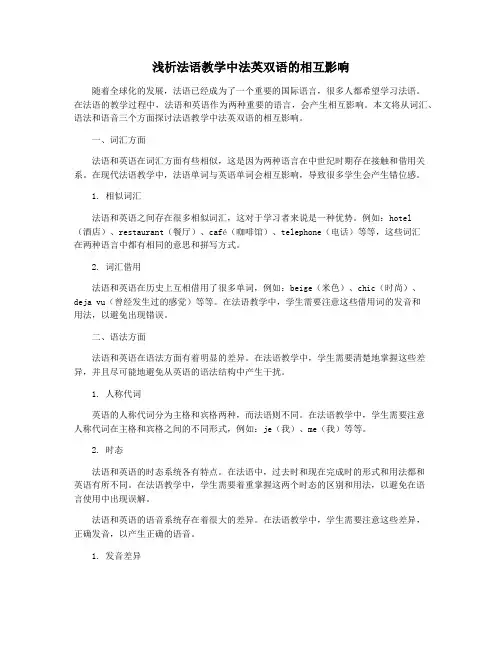
浅析法语教学中法英双语的相互影响随着全球化的发展,法语已经成为了一个重要的国际语言,很多人都希望学习法语。
在法语的教学过程中,法语和英语作为两种重要的语言,会产生相互影响。
本文将从词汇、语法和语音三个方面探讨法语教学中法英双语的相互影响。
一、词汇方面法语和英语在词汇方面有些相似,这是因为两种语言在中世纪时期存在接触和借用关系。
在现代法语教学中,法语单词与英语单词会相互影响,导致很多学生会产生错位感。
1. 相似词汇法语和英语之间存在很多相似词汇,这对于学习者来说是一种优势。
例如:hotel(酒店)、restaurant(餐厅)、café(咖啡馆)、telephone(电话)等等,这些词汇在两种语言中都有相同的意思和拼写方式。
2. 词汇借用法语和英语在历史上互相借用了很多单词,例如:beige(米色)、chic(时尚)、deja vu(曾经发生过的感觉)等等。
在法语教学中,学生需要注意这些借用词的发音和用法,以避免出现错误。
二、语法方面法语和英语在语法方面有着明显的差异。
在法语教学中,学生需要清楚地掌握这些差异,并且尽可能地避免从英语的语法结构中产生干扰。
1. 人称代词英语的人称代词分为主格和宾格两种,而法语则不同。
在法语教学中,学生需要注意人称代词在主格和宾格之间的不同形式,例如:je(我)、me(我)等等。
2. 时态法语和英语的时态系统各有特点。
在法语中,过去时和现在完成时的形式和用法都和英语有所不同。
在法语教学中,学生需要着重掌握这两个时态的区别和用法,以避免在语言使用中出现误解。
法语和英语的语音系统存在着很大的差异。
在法语教学中,学生需要注意这些差异,正确发音,以产生正确的语音。
1. 发音差异法语和英语在发音方面存在很大的差异,例如:法语中的元音音素比英语发音的要多;法语语音中有很多的鼻音,英语中则较少等等。
在法语教学中,学生需要逐步掌握这些差异,并且培养发音的能力。
2. 重音法语和英语的重音系统有所不同。
法语外来词对英语的影响作者:邓争艳来源:《文教资料》2017年第04期摘要:本文对英语中法语外来词进行概述,就法语外来词对英语语言和英国社会的影响进行剖析,研究成果有利于加强对英语中法语外来语的理解,更深刻地认识法语外来词汇对英语语言和社会文化所产生的影响。
关键词:法语外来词语言社会文化一、英语中的法语外来词英语属印欧语系中的日耳曼语族,词汇量约在100万左右,主要由本族词和外来词构成。
英语本族词源于公元5世纪的盎格鲁-撒克逊词语,大约50000到60000个。
外来词,也称借词或外来语,指一种语言从别的语言借来的词汇。
英语吸收和改造外来语的能力特别强,至少向50多个语种借用了大量的外来词。
英语词汇总量的80%源于希腊语、拉丁语、法语、西班牙语和其他种类语言的外来词,其中以隶属印欧语系中的罗曼语族的法语词汇居多。
根据斯基特的《词源词典》统计,英语中来自法语的词汇占26.4%。
英语借用法语大致有三个重要的时间段,一是公元1006年至1204年的诺曼征服,法语一度成为英国官方用语,英国上层阶级、作家和学者们纷纷学习法国文化,以用法语进行交际为荣;二是15、16世纪的文艺复兴时期,法国成为欧洲文化中心;三是17世纪末、18世纪初的查理二世斯图亚特复辟,法语再次风靡英国。
二、法语外来词对英语语言的影响(一)语音方面英语在借入大量法语词汇的同时,也吸纳了这些词汇中英语之前没有的两个辅音:[v]和[f]。
在古英语中,[f]和[v]两个音素的区别即[v]仅仅是[f]的变体。
字母f在词尾或词首时发[f]音,在两个元音之间发[v]音,后来由于来自法语的外来词有以[v]音开头的词,[v]才成为一个独立的音素。
(二)词义方面1.大量同义词共存借入的法语外来词中有一部分词义是与英语本族词词义重合的,因此英语中出现了大量同义词共存的现象。
例如:表示“开始”,英语为begin,法语为commence;表示“停止”,英语为stop,法语为cease;表示“明智的”,英语为wise,法语为sage;表示“询问”,英语为ask,法语为inquire。
英语中的法语借词研究英语与法语有着密切的历史和文化,这种在语言上也有所体现。
英语从法语中借用了许多词汇,这些借词在英语中广泛使用,为英语词汇库增添了丰富的色彩。
本文将对英语中的法语借词进行深入研究,探究其特点、来源及历史背景。
一、英语中的法语借词特点1、拼写变化英语中的法语借词在拼写上往往发生了变化。
例如,法语中的“beau”在英语中变成了“beautiful”,法语中的“rendezvous”在英语中变成了“reunion”。
这些变化使得这些借词在英语中看起来更像英语词汇,但它们仍然保留了法语的发音和意义。
2、常用词汇英语中的法语借词多为常用词汇,如“delicieux”(美味的)、“premi ère”(第一的)等。
这些词汇在英语中广泛使用,已经成为英语不可或缺的一部分。
3、涉及领域广泛英语中的法语借词涉及领域广泛,包括政治、军事、文化、艺术、食品、时尚等多个领域。
这些借词为英语提供了更多精确和生动的表达方式。
二、英语中的法语借词来源1、诺曼底征服1066年,诺曼底公爵威廉征服英格兰,将法语作为官方语言。
这一历史事件使得大量法语词汇进入英语,丰富了英语词汇库。
2、贸易和外交贸易和外交也是英语中的法语借词的重要来源。
在国际贸易和外交交流中,英语往往需要借鉴其他语言来表达某些概念或思想。
3、文化和艺术英语中的法语借词还来源于文化和艺术领域。
例如,英文中的“ballet”就源自法语中的“ballet”。
三、英语中的法语借词历史背景法语对英语的影响可以追溯到公元1066年,诺曼底公爵威廉征服英格兰,将法语作为官方语言。
这一历史事件使得大量法语词汇进入英语。
在此之后,随着贸易、文化和外交交流的不断发展,英语中的法语借词也不断增加。
四、结论英语中的法语借词历史悠久,涉及领域广泛,为英语词汇库增添了新的元素。
这些借词在英语中经过本土化改造,已经成为了英语不可或缺的一部分。
通过深入研究英语中的法语借词,我们可以更好地理解英语的发展历程和法国文化对英国文化的影响。
英语词汇中的法语因素分析作者:钟文硕来源:《青年文学家》2013年第35期摘要:由于历史原因,英语词汇受到法语的影响很大。
法语借词对于英语词汇的影响主要体现在辨识度很高的字母组合,尤其是词尾。
法语词汇在进入英语之后大部分被英语同化,但也有一部分保留了原有的拼写和发音规则。
关键词:英语词汇;法语;借词作者简介:钟文硕(1982-),男,吉林长春人,辽宁石油化工大学外国语学院教师,研究方向为英语词汇学和词源学。
[中图分类号]:H313.1 [文献标识码]:A[文章编号]:1002-2139(2013)-35--011.引言1066年,诺曼底公爵威廉召集大量法国封建主,一起发兵侵入英国。
当年年底,威廉加冕英国的国王。
从此开始了法国对英国的统治。
法语进入英国社会。
在此之前,英语的发展处于第一个阶段,即古英语时期。
而法语的进入则将英语发展带入一个新的时期,即中世纪英语阶段。
此后的三个世纪,法语在英国上层社会被广泛应用,而英语则更多在普通老百姓之间使用。
法语词汇在此后的几百年间一直影响着英语。
在中古英语时期,大约有1万多法语词被直接引进英语。
[1]两种语言虽然都属于印欧语系,但英语属于日耳曼语族,而法语则是罗曼语族的一种。
但由于历史原因所造成的语言融合,二者确实在词汇方面存在相当多的相似之处。
在英语词汇中可以发现很多法语的因素。
2. 英语词汇中的法语字母组合英语有26个字母,法语同样有26个字母,且单个字母的写法与英语相同,但发音不同。
法语字母在单词拼写时有变音符号,变音符号的作用主要是标注不同的发音。
在某些情况下,变音符号也可以区分词汇的含义。
英语和法语在单词拼写规则上有一定的区别。
法语词汇的发音除了要注意单个字母之外,还有一些字母组合的发音有其独有的特征,例如ch, qu, gn,am, an, au, ou, eu, oin等。
英语中,元音字母和辅音字母在英语词汇中起着不同的作用。
英语字母中的五个元音字母a, e, i, o, u在词汇中主要起辅助发音的作用。
[精品]浅析英语中的法语外来词英语中的法语外来词是指源自法语的词汇,这些词汇在英语中被广泛使用,且具有重要的意义和影响。
这些法语外来词通常是在中世纪时期由法国的诗人、学者和外交官引入英语中的,随着时间的推移,这些词汇逐渐融入到英语的词汇系统中。
下面将对英语中的一些常见法语外来词进行浅析。
首先,法语外来词在英语中主要涵盖了各个领域,如文学、艺术、音乐、法律、政治、时尚等。
比如在文学方面,我们经常使用的词汇如literature(文学)、poetry(诗歌)、novel(小说)等都是源自法语。
在艺术方面,词汇如painting(绘画)、sculpture(雕塑)、exhibition(展览)等也是源自法语的。
这些法语外来词的使用丰富了英语词汇的表达能力,使得英语能够更加准确地描述事物和概念。
其次,法语外来词在英语中具有一定的特点。
首先,这些词汇通常保留了法语的发音和拼写方式,比如châtea u(城堡)、résumé(摘要)、entrepreneur(企业家)等。
其次,这些词汇通常具有高雅、精确的意义,使得它们在特定领域中得到广泛应用。
比如在法律领域,我们使用的词汇如judge(法官)、jury(陪审团)、verdict(判决)等都是源自法语的。
再次,这些词汇在英语中的使用方式和语法规则也与法语有所不同。
比如在法语中,形容词通常位于名词之后,而在英语中则是位于名词之前,比如le livre intéressant(有趣的书)在英语中则是an interesting book(一个有趣的书)。
最后,法语外来词的使用不仅仅是为了增加词汇量和表达能力,也反映了英语和法语之间的文化交流和相互影响。
通过使用法语外来词,英语借鉴了法语的优秀词汇,丰富了自己的表达方式,同时也与法语形成了一种文化联系。
这种文化联系也有助于人们更好地理解和欣赏法国文化。
总之,英语中的法语外来词在词汇系统中起着重要的作用,丰富了英语的表达能力,反映了英语和法语之间的文化交流。
西南交通大学学报(社会科学版) 2005年11月JOURNAL OF S OUT H W EST J I A OT ONG UN I V ERSI TYNov .2005第6卷 第6期(Social Sciences )Vol .6 No .6[收稿日期] 2004212216[作者简介] 徐友香(1954-),女,浙江江山人,副教授。
中期英语词汇中法语借词的特征及社会影响徐友香,王 茜(西南交通大学外国语学院,四川成都610031)[关键词] 中期英语;法语借词;特征;社会影响[摘 要] 11世纪初到14世纪中叶,英法两国之间战争不断,在社会变革的同时,语言词汇也发生了相应的变化。
中期英语中法语借词的特点在于:(1)法语借词与本土英语既有同义性,又有差异。
(2)出现了法语借词加英语词缀或法语词缀加英语词根构成另一个新词等现象。
(3)法语借词进入英语之后,其词义出现扩展、缩小、升格、降格等现象。
法语借词使英国社会不同阶层的人所使用的语言有所区别。
[中图分类号] H31/H32[文献标识码] A[文章编号] 1009-4474(2005)06-0029-04On Fea tures and Soc i a l I nfluence of Borrowed W ords from French i n M i ddle EnglishXU You 2xiang,WANG Q ian(College of Foreign L anguages,S ou thw est J iaotong U n iversity,Chengdu 610031)Key words :M iddle English;borr owed words fr om French;hist orical backgr oundAbstract :The continuous war bet w een B ritain and France fr om the beginning of the 11th century t o the m iddle of the 14th century resulted in not only the revoluti on of s ociety but als o the changes of language and vocabulary .The features of borr o wed words fr o m French in M iddle English include:(1)borr owed words fr om French and native English have both si m ilarities and differences;(2)thereappeared borr o wed words with English affixes or French affixed with English r oot;(3)there appeared the changes of meaning such as extensi on,s pecializati on,elevati on and degradati on .Due t o the borr owed words fr om French,B ritish peop le fr om different s ocial classes used English in a different manner . 一、中期英语中法语借词的涌入1066年诺曼底公爵征服了英国,并成为英国国王。